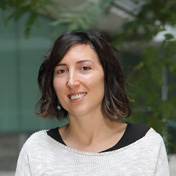Objectives
Abstract: The dynamic deposition of chemical modifications into RNA is a crucial regulator of temporal and spatial accurate gene expression programs. A major difficulty in studying these modifications, however, is the need of tailored protocols to map each RNA modification individually. In this context, direct RNA nanopore sequencing (dRNA-seq) has emerged as a promising technology that can overcome these limitations, as it is in principle capable of mapping all RNA modifications simultaneously, in a quantitative manner, and in full-length native RNA reads. Here I will present the latest work on how we can use dRNA-seq to identify RNA modifications with single nucleotide and single molecule resolution, to then study the biological functions and dynamics of the epitranscriptome, their interplay with other regulatory layers, as well as to decipher how and why epitranscriptomic dysregulation is often associated to human disease.
 Short bio: In the last twelve years, I have conducted research in the fields of protein translation, RNA epitranscriptomics and bioinformatics. During this period, I have published 30 peer-reviewed publications, which include 13 publications as corresponding and last author in Q1 journals. In addition, I have written 8 reviews and book chapters, including 6 as corresponding author. Since September 2018, I lead the “Epitranscriptomics and RNA Dynamics laboratory” at the Centre for Genomic Regulation (CRG). In these few years, we have established ourselves as leaders in the use and development of direct RNA nanopore sequencing technologies to study RNA modifications. Specifically, we have pioneered the development of novel algorithms to map and quantify RNA modifications (Liu et al., Nat Comm 2019, Begik et al., Nat Biotech 2021), we have optimized the library preparations to make the technology applicable to low-input patient-derived samples (Smith et al., Genome Res 2020) and we have expanded its applicability beyond coding mRNAs (Begik et al., Nat Methods 2021). In our laboratory, we are now applying this technology to: i) decipher the role that RNA modifications play in sperm formation, maturation and intergenerational inheritance (project funded by ERC Starting Grant 2022); ii) dissect how RNA modification dysregulation leads to human disease (Begik et al., Genome Biol 2020) and apply this for the development of novel antitumoral targets (project funded by MERCK Innovation Grant 2021); and iii) bring this technology to the next level to make it applicable for rapid cancer diagnosis, classification of cancer types, and cancer prognosis (project funded by AECC, LAB AECC Grant 2021)
Short bio: In the last twelve years, I have conducted research in the fields of protein translation, RNA epitranscriptomics and bioinformatics. During this period, I have published 30 peer-reviewed publications, which include 13 publications as corresponding and last author in Q1 journals. In addition, I have written 8 reviews and book chapters, including 6 as corresponding author. Since September 2018, I lead the “Epitranscriptomics and RNA Dynamics laboratory” at the Centre for Genomic Regulation (CRG). In these few years, we have established ourselves as leaders in the use and development of direct RNA nanopore sequencing technologies to study RNA modifications. Specifically, we have pioneered the development of novel algorithms to map and quantify RNA modifications (Liu et al., Nat Comm 2019, Begik et al., Nat Biotech 2021), we have optimized the library preparations to make the technology applicable to low-input patient-derived samples (Smith et al., Genome Res 2020) and we have expanded its applicability beyond coding mRNAs (Begik et al., Nat Methods 2021). In our laboratory, we are now applying this technology to: i) decipher the role that RNA modifications play in sperm formation, maturation and intergenerational inheritance (project funded by ERC Starting Grant 2022); ii) dissect how RNA modification dysregulation leads to human disease (Begik et al., Genome Biol 2020) and apply this for the development of novel antitumoral targets (project funded by MERCK Innovation Grant 2021); and iii) bring this technology to the next level to make it applicable for rapid cancer diagnosis, classification of cancer types, and cancer prognosis (project funded by AECC, LAB AECC Grant 2021)
Speakers
Speaker: Eva Novoa, Epitranscriptomics and RNA Dynamics Group leader at Novoa Lab
Host: Marta Melé, Transcriptomics and Functional Genomics Lab Group Leader
